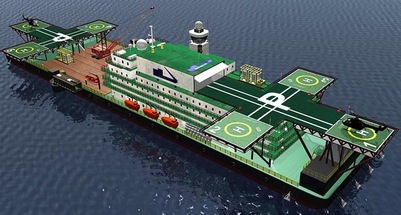Tech skills shortage solution: set up workplace in international waters

The Silicon Valley tech scene is again one of the brightest stars in the US economy, but its growth is hitting a ceiling: there just aren't enough visionary entrepreneurs, skilled engineers, developers, technicians and other professionals to sustain growth.

Hampering the ability to attract global talent -- which has fueled the growth of the US tech industry in the past -- is a limit on the number of foreign entrepreneurs or workers that can enter and work within the country. Currently, work visas are capped at 140,000 people a year. With recent economic conditions, there has been considerable pressure on Congress to maintain restrictions on the inflow of foreign workers.
One entrepreneur, however, has come up with an interesting workaround to the challenge: anchor a large ship off the coast of San Fransisco, in international waters, and recruit professionals from other nations to work on board.
Blueseed, a startup incubator (and startup itself), proposes to set such a ship afloat as a "high-tech visa-free entrepreneurship and technology incubator on an ocean vessel in international waters." The ship will be positioned as "a short ferry ride away from Silicon Valley so that great ideas and talent from around the world can live, work, and play while having convenient access to the San Francisco Bay Area." International entrepreneurs and professionals would be able to use tourist or short-term business visas -- which are easier to obtain the work visas -- to take regular jaunts to the mainland.
Presumably, the ship will be more like a cruise line, and not an Alaskan fishing trawler. And, it's often said you need a strong stomach for the ups and downs of running a startup -- a few weeks on the Pacific in January may add a whole new dimension to that warning.
As Bluseed explains it: "We will provide a customized environment centered around smart, proven, cost-effective legal best practices, and modern living and work accommodations.... With our incubator, startups and individuals will also get a chance to establish the connections and capital necessary to move their operations onto land if they so choose."
CNET's Declan McCullagh described this "seasteading" venture a few weeks back, noting that Blueseed CEO Max Marty's goal is to attract up to 1,000 global entrepreneurs who want to be a hop, skip and a jump from Silicon Valley and its networks of investors, suppliers, and social opportunities. Blueseed plans to charge $1,855 per person per month in rent, and also take a 5% equity stake in participating startups.
Blueseed also just announced Silicon Valley investor and Paypal founder Peter Thiel bought a stake in Blueseed, bringing the concept closer to reality. The most intensive up-front expense for the Blueseed venture is the purchase of a ship, be it a mothballed cruise ship or a barge to be retrofitted.
There is a solid case to be made for committing such energy and resources into creating more opportunities for domestic workers and entrepreneurs. But global talent also helps fuel greater domestic opportunities as well. Marty came up with the idea after seeing many classmates at the University of Miami be forced to go back to their home countries after failing to secure work visas, according to USA Today. "I thought: 'This is terrible. These people could be here adding a lot of value,' " he is quoted as saying. "There's a lot of job creation and job growth that could be happening if this situation were changed."
This post was originally published on Smartplanet.com